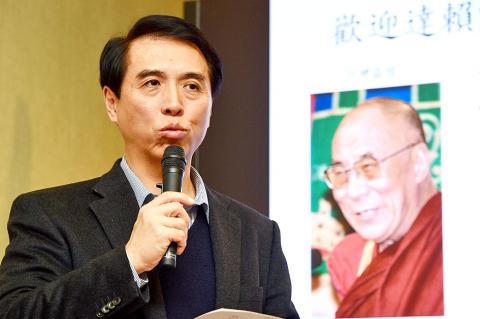Premier Simon Chang (張善政) yesterday promised to keep an open mind on a possible visa application from the Dalai Lama, saying the government would not reject his application on political grounds.
During a question-and-answer session at the Legislative Yuan, Democratic Progressive Party (DPP) Legislator Chuang Ruei-hsiung (莊瑞雄) asked Chang what the attitude of President Ma Ying-jeou’s (馬英九) administration was toward allowing the exiled Tibetan spiritual leader to visit Taiwan.
“The Dalai Lama has visited Taiwan three times. As I understand, he has not applied for another visa. As long as he files an application, we will process his request accordingly,” Chang said.

Photo: Lo Pei-der, Taipei Times
Approval of a visa application would hinge on the purpose of the proposed visit, the premier said, adding: “If the visit is beneficial to both sides, I do not see any reason why we should not let him come.”
“So, does that mean that the government would adopt an open attitude should the Tibetan spiritual leader submit a visa application?” Chuang said.
Chang said that by openness, he meant the government would accept a visa application and would refrain from impeding the Dalai Lama’s application using “bizarre political reasons of any kind.”
Earlier in the day he had said that the visa issue would be decided by consultations between the Mainland Affairs Council and other government agencies.
Chinese Nationalist Party (KMT) Legislator Apollo Chen (陳學聖) on Monday launched a petition urging Ma to issue a visa to the Dalai Lama so he could visit before Ma’s presidential term ends on May 20. He said that since the Dalai Lama is no longer the leader of the Tibetan government-in-exile, the administration has no reason not to let him visit.
Chen yesterday afternoon held a news conference in Taipei to reiterate his appeal.
Meanwhile, asked about the visa issue on the sidelines of the legislative session, Mainland Affairs Council Minister Andrew Hsia (夏立言) said that everything depended on the situation if and when the Dalai Lama submitted an application.
Asked if China would exert pressure on Taiwan over the issue, Hsia said: “I believe we all know about China’s stance on a visit by the Dalai Lama to Taiwan. We have our own procedures and everything will be processed accordingly.”
Andrew Lee (李憲章), the deputy director-general of the Ministry of Foreign Affairs’ Public Diplomacy Coordination Council, said that visa applicants must file documents detailing the purpose of their proposed trip before their applications can be evaluated.
“Since the Dalai Lama has not submitted an application yet, it is too early to say if such a request would be approved or not,” Lee said.
The Dalai Lama’s most recent visit to Taiwan began on Aug. 30, 2009, after he was invited by seven DPP mayors and county commissioners to hold religious services for victims of Typhoon Morakot, which had ravaged southern Taiwan earlier that month.

The CIA has a message for Chinese government officials worried about their place in Chinese President Xi Jinping’s (習近平) government: Come work with us. The agency released two Mandarin-language videos on social media on Thursday inviting disgruntled officials to contact the CIA. The recruitment videos posted on YouTube and X racked up more than 5 million views combined in their first day. The outreach comes as CIA Director John Ratcliffe has vowed to boost the agency’s use of intelligence from human sources and its focus on China, which has recently targeted US officials with its own espionage operations. The videos are “aimed at

STEADFAST FRIEND: The bills encourage increased Taiwan-US engagement and address China’s distortion of UN Resolution 2758 to isolate Taiwan internationally The Presidential Office yesterday thanked the US House of Representatives for unanimously passing two Taiwan-related bills highlighting its solid support for Taiwan’s democracy and global participation, and for deepening bilateral relations. One of the bills, the Taiwan Assurance Implementation Act, requires the US Department of State to periodically review its guidelines for engagement with Taiwan, and report to the US Congress on the guidelines and plans to lift self-imposed limitations on US-Taiwan engagement. The other bill is the Taiwan International Solidarity Act, which clarifies that UN Resolution 2758 does not address the issue of the representation of Taiwan or its people in

SHIFT: Taiwan’s better-than-expected first-quarter GDP and signs of weakness in the US have driven global capital back to emerging markets, the central bank head said The central bank yesterday blamed market speculation for the steep rise in the local currency, and urged exporters and financial institutions to stay calm and stop panic sell-offs to avoid hurting their own profitability. The nation’s top monetary policymaker said that it would step in, if necessary, to maintain order and stability in the foreign exchange market. The remarks came as the NT dollar yesterday closed up NT$0.919 to NT$30.145 against the US dollar in Taipei trading, after rising as high as NT$29.59 in intraday trading. The local currency has surged 5.85 percent against the greenback over the past two sessions, central

‘MISGUIDED EDICT’: Two US representatives warned that Somalia’s passport move could result in severe retaliatory consequences and urged it to reverse its decision Minister of Foreign Affairs Lin Chia-lung (林佳龍) has ordered that a special project be launched to counter China’s “legal warfare” distorting UN Resolution 2758, a foreign affairs official said yesterday. Somalia’s Civil Aviation Authority on Wednesday cited UN Resolution 2758 and Mogadishu’s compliance with the “one China” principle as it banned people from entering or transiting in the African nation using Taiwanese passports or other Taiwanese travel documents. The International Air Transport Association’s system shows that Taiwanese passport holders cannot enter Somalia or transit there. The Ministry of Foreign Affairs (MOFA) protested the move and warned Taiwanese against traveling to Somalia or Somaliland